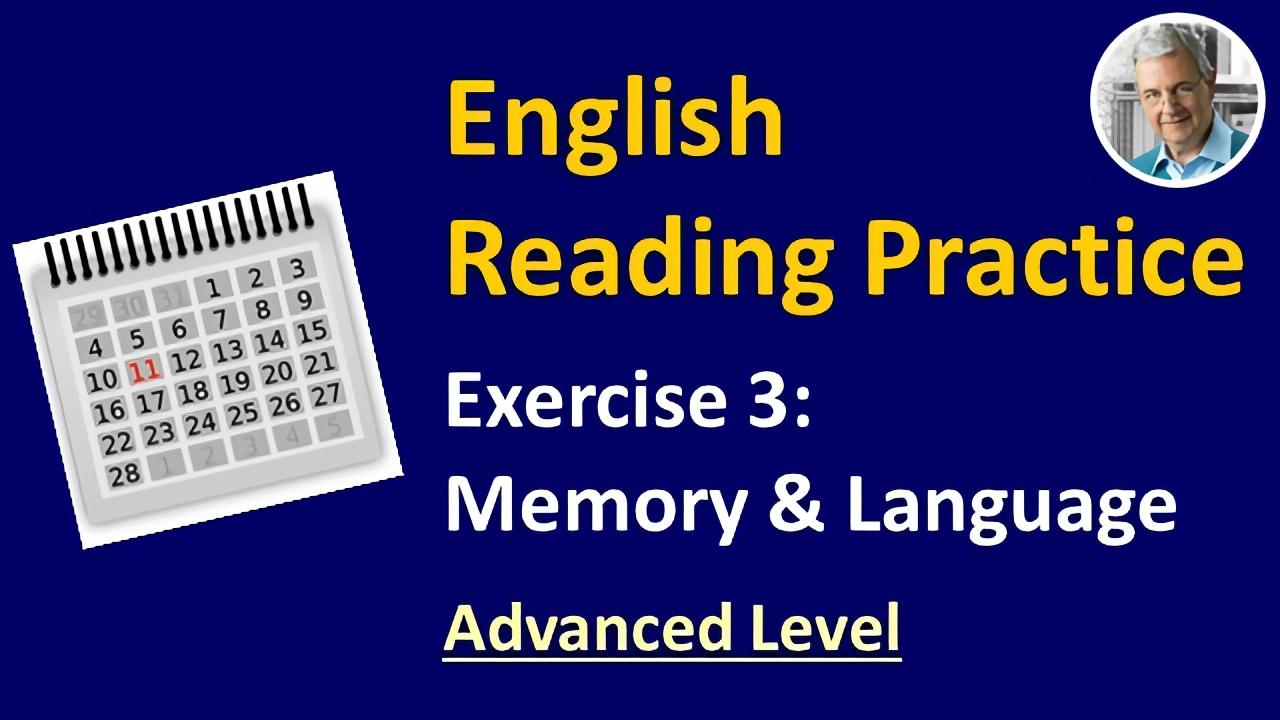ENGLISH Reading Exercise #3 (Intermediate): Memory & Language
English Reading Practice Exercise 3 (Intermediate)
Click Here for ENGLISH READING PRACTICE EXERCISES
Beginner to Intermediate Level
This exercise has been created for English students who are at a beginner to intermediate level. The pace of the reading is slower, with emphasis on pronouncing all the syllables.
During this English reading practice session, you will read along with the teacher at the same time, with the teacher’s voice superimposed over their own, students start to self-correct in the areas of pronunciation and fluency, learning to read and speak in natural word groups.
After a student feels comfortable at this pace, they can do the exercise created for intermediate to advanced students, which is faster and sounds normal for a native speaker.
English reading practice will certainly help you speak English fluently or at least great improve your English fluency.
Here is the transcript for the video: “ENGLISH Reading Exercise #3 (Intermediate): Memory & Language”
Exercise 3: Memory & Language
Be sure to watch the introductory video to this playlist before doing this exercise.
Click on the link below in the Description . . .
(https://youtu.be/IOeaBha6dUU)
Instructions
- Turn up the volume so the teacher’s voice is loud.
- Read the words in red out loud at the same time as the teacher.
- Pay attention to the teacher’s voice intonation and the word groups.
If you find the pace is too slow, then go to the advanced version here:
ENGLISH Reading Exercise #3 (Advanced): Memory & Language
The text:
Why You Should Remember Just Before You Forget!
Why should you remember something you are trying to learn, just before you forget it? Because remembering it too early doesn’t help, and trying to remember it too late means you have already forgotten it.
At least, this is what the late Dr. Paul Pimsleur discovered in his research.
Dr. Pimsleur became one of the world’s leading experts on language teaching before his untimely death at the age of 48 in 1976. His language teaching courses have since become very popular.
They include what he called Graduated Interval Recall, in other words, remembering what you are learning by having it repeated just at the point before you forget.
Pimsleur’s recommended recall rate went as follows: 5 seconds, 25 seconds, 2 minutes, 10 minutes, 1 hour, 5 hours, 1 day, 5 days, 25 days, 4 months, 2 years. While there may be some flexibility in that schedule, it gives some idea as to the kind of repetition required for information to go into long-term memory.
The graduated interval recall method can be employed by using 1) flash cards and pictures, 2) songs. By repeating songs, key phrases and collocations can be easily remembered.
Closely associated with remembering before you forget is another key component of the Pimsleur method – Anticipation.
Anticipation involves getting the student to recall information previously learned and then having it confirmed by the teacher.
The student therefore is encouraged to ‘anticipate’ a correct answer. (Pimsleur) How is a student encouraged to recall previously learned information? Simply through questions.
Questions are the digging tools of the mind. The brain is greatly affected by a question. “Of all the things we could be noticing at any given time, there is only a small number we can consciously focus on. By asking a question, either of yourself or of someone else, you can instantly change focus.” (Robbins)
Questions, questions, questions! They are the barbs that hook a learner’s attention. So by asking the student a question related to previously taught vocabulary, the brain is activated to dig through the memory bank, retrieve the appropriate information, and then present it audibly.
The teacher then simply reinforces the answer by repeating what the student just said, thus confirming the student’s answer and completing Pimsleur’s Anticipation stage.
By combining the Anticipation method using questions with Graduated Interval Recall, repetition carefully staged at set time intervals, a language student will enjoy a much higher retention level. Such is the power of remembering just before you forget.
That is the end of the reading.
Repeat this exercise many times until you can synchronize your reading with the teacher.
Practice other exercises in this playlist and see a major improvement in your English speaking fluency.
References
Books
- Tony Buzan with Barry Buzan (1995).
The Mind Map Book. Revised edition 1995. Butler & Tanner Ltd, Frome and London. p.27 - Tony Buzan. (1991) Use Both Sides Of Your Brain. Published by Plume, an imprint of Dutton Signet, a division of Penguin Books USA Inc. January 1991. p.93
- Edward De Bono. (1990) Lateral Thinking. Reprinted in Penguin Books 1990. p.10
Has this video helped you? Hit LIKE now!
Continually IMPROVE YOUR ENGLISH by subscribing to this channel.
Hit the subscribe button NOW!
Click the bell icon and choose All to be notified when there are new videos!
Build A Powerful English Vocabulary with my FREE course on Udemy.
Go to: http://goodenglish.online
If you found this English reading exercise helpful, try another one:
English Reading Exercise #2 (Intermediate): Mind Maps


